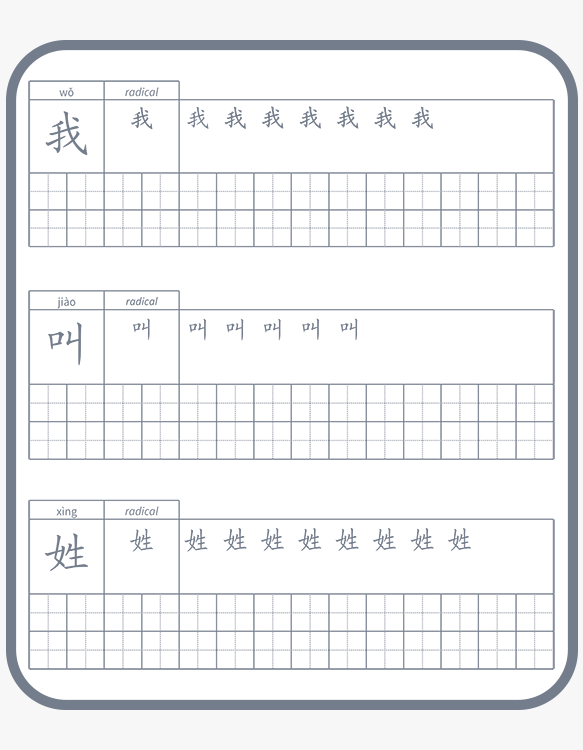Level 3 Lesson 1.1 – 跟 一样 习惯 方便 洗手间
HSK 3+ VOCABULARY: 跟 一样 习惯 方便 洗手间
In this video lesson we'll learn the vocabulary in Lesson 1 and practice them with a lot of example sentences. For new Chinese characters, we'll learn how to write them and know about their structures and origins in the attached writing sheet.
- VOCABULARY: 跟 一样 习惯 方便 洗手间
- CHINESE CHARACTERS: 跟 惯 便
- COMMON CHINESE FAMILY NAMES: 习(xí) 方(fāng)
STEPS (Preferably planned on different days):
- Finish the video lesson, give it some time to absorb and review the content
- Finish writing sheet
- Do practice task
- Do quiz
- Review
DOWNLOADS
VOCABULARY
| HSK 2.0 |
HSK 3.0 |
CHINESE | PINYIN | P.O.S. | ENGLISH |
|---|---|---|---|---|---|
| 3 | 2 |
跟
|
gēn | conj. / prep. | and / with |
| 3 | 3 |
一样
|
yíyàng | adj. | the same; not different; alike |
| 3 | 3 |
习惯
|
xíguàn | n. / v. | habit; custom / to get used to; to get accustomed to |
| 3 | 3 |
方便
|
fāngbiàn | adj. | convenient; handy |
| 3 | 2 |
洗手间
|
xǐshǒujiān | n. | restroom; bathroom |
EXAMPLE SENTENCES
1. 跟 gēn · HSK 2
(1) conj. 连词 liáncí ▸ and
- niúnǎi gēn jīdàn
牛奶跟鸡蛋
milk and egg - Wǒ gēn Zhāng Hùshi shì hěn duō nián de línjū le.
我跟张护士是很多年的邻居了。
Me and Nurse Zhang (have) been neighbors (for) many years. - Wǒ duìzúqiú gēn lánqiú dōu hěn gǎn xìngqù.
我对足球跟篮球都很感兴趣。
I (am) quite interested in both soccer and basketball.
(2) prep. 介词 jiècí ▸ with
- gēn tā jiéhūn
跟他结婚
to get married with him - Xiǎo Gāo xiǎng gēn Zhōng Xiǎohóng tán liàn'ài.
小高想跟钟小红谈恋爱。
Little Gao wants to be in a romantic relationship with Zhong Xiaohong. - Nǐ gēn tóngshìmen yìqǐ qù ba!
你跟同事们一起去吧!
You (can) go together with (your) coworkers!
2. 一样 yíyàng · HSK 3
adj. 形容词 xíngróngcí ▸ the same; not different; alike
- yíyàng de xìngqù
一样的兴趣
same interest - bùyíyàng de dǎsuàn
不一样的打算
different plan/intention - yíyàng jiǎndān
一样简单
the same (degree of being) easy
- Zhè liǎng jiàn yīfu de jiàgé shìyíyàng de.
这两件衣服的价格是一样的。
The price of these two "jian " (of) clothes are (something that is) the same. - Tāmen shuō Hànyǔ shuō de yíyàng hǎo.
他们说汉语说得一样好。
They speak Chinese the same (degree of) well. - Wǒmen zài yìqǐ hěn duō nián le, jié bu jiéhūn dōu yíyàng.
我们在一起很多年了,结不结婚都一样。
We (have) been together (for) many years (already), getting married (or) not getting married (is) both the same.
3. 习惯 xíguàn · HSK 3
(1) n. 名词 míngcí▸ habit; custom
- hǎo xíguàn
好习惯
good habit - huài xíguàn
怀习惯
bad habit
- Zhè ge xuésheng de xuéxí xíguàn hěn hǎo, suǒyǐ tā měi cì kǎoshì de chéngjì dōu búcuò.
这个学生的学习习惯很好,所以她每次考试的成绩都不错。
This "ge" (of) student's learning habit (is) very good, so her test score (is) not bad every time. - Xiànzài de rén měitiān dōu xǐhuan wánr shǒujī、wánr diànnǎo, zhè ge xíguàn duì yǎnjing hěn bù hǎo.
现在的人每天都喜欢玩儿手机、玩儿电脑,这个习惯对眼睛很不好。
People nowadays like playing cellphones(, and) playing computers all (of) every day, this habit (is) very bad (for the) eyes.
(2) v. 动词 dòngcí▸ to get used to; to get accustomed to
- xíguàn le
习惯了
to (have) gotten used to - bùxíguàn
不习惯
to not be used to
- Nǐ lái Zhōngguó liǎng nián le, duì zhèlǐ xíguàn le ma?
你来中国两年了,对这里习惯了吗?
You (have) come to China (for) two years (now), (have you) gotten used to here (now)? - Jiéhūn yǐqián wǒ xíguàn měitiān jiào wàimài, xiànzài yào měitiān zìjǐ zuòfàn, wǒ hái méi xíguàn ne!
结婚以前我习惯每天叫外卖,现在要每天自己做饭,我还没习惯呢!
(In the) time (that is) before getting married I used to order food every day, now (I) need to cook (by my)self every day, I still (have) not gotten used to (it)!
4. 方便 fāngbiàn · HSK 3
adj. 形容词 xíngróngcí▸ convenient; handy
- Zuò dìtiě yòu kuài yòu fāngbiàn.
坐地铁又快又方便。
Taking subway (is) fast and convenient. - Wǒ jiā chúfáng tài xiǎo le, zuò fàn fēicháng bù fāngbiàn.
我家厨房太小了,做饭非常不方便。
My home(’s) kitchen (is) too small, cooking meal (is) very not convenient.
5. 洗手间 xǐshǒujiān · HSK 2
n. 名词 míngcí ▸ restroom; bathroom
- nǚ xǐshǒujiān
女洗手间
female bathroom; female restroom - nán xǐshǒujiān
男洗手间
male bathroom; male restroom
- shàng xǐshǒujiān
上洗手间
to use the bathroom/restroom - yòng xǐshǒujiān
用洗手间
to use the bathroom/restroom - qù xǐshǒujiān
去洗手间
to go to the bathroom/restroom
6 Comments
Leave a Reply
You must be logged in to post a comment.

一。这个学生的学习习惯很好,所以她每次考试的成绩也不错。
二。这个学生的学习方式很好,所以她每次考试的成绩也不错。
这两个句子的意思不是一样的。学习习惯跟学习方式不一样。
每个学生都分别有独特的学习方式,他们习惯了他们自己的学习方式。
Reply
一。这个学生的学习习惯很好,所以她每次考试的成绩也不错。
二。这个学生的学习方式很好,所以她每次考试的成绩也不错。
这两个句子的意思不是一样的。学习习惯跟学习方式不一样。
每个学生都有分别独特的学习方式,他们习惯了他们自己的学习方式。
Love the courses but why are there no character writing lessons at the HSK 3 level? They were very useful on the HSK 1 and HSK 2 courses
Thank you so much for your suggestion. We’re sorry that we don’t have writing sheets for our Level 3 course. We’ve decided at this intermediate level to shift the focus from characters and their structures to vocabulary expansion and fluency building. We apologize for any inconvenience this causes.
牛奶跟鸡蛋
跟他结婚
一样的兴趣
好习惯
习惯了
我家厨房很方便
请问洗手间在哪里?
我想谢谢你们越来越用中文教中文!听说用中文学中文很有用。